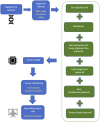Artificial intelligence and database for NGS-based diagnosis in rare disease
- PMID: 38371307
- PMCID: PMC10870236
- DOI: 10.3389/fgene.2023.1258083
Artificial intelligence and database for NGS-based diagnosis in rare disease
Abstract
Rare diseases (RDs) are rare complex genetic diseases affecting a conservative estimate of 300 million people worldwide. Recent Next-Generation Sequencing (NGS) studies are unraveling the underlying genetic heterogeneity of this group of diseases. NGS-based methods used in RDs studies have improved the diagnosis and management of RDs. Concomitantly, a suite of bioinformatics tools has been developed to sort through big data generated by NGS to understand RDs better. However, there are concerns regarding the lack of consistency among different methods, primarily linked to factors such as the lack of uniformity in input and output formats, the absence of a standardized measure for predictive accuracy, and the regularity of updates to the annotation database. Today, artificial intelligence (AI), particularly deep learning, is widely used in a variety of biological contexts, changing the healthcare system. AI has demonstrated promising capabilities in boosting variant calling precision, refining variant prediction, and enhancing the user-friendliness of electronic health record (EHR) systems in NGS-based diagnostics. This paper reviews the state of the art of AI in NGS-based genetics, and its future directions and challenges. It also compare several rare disease databases.
Keywords: artificial intelligence; data science; diagnosis; machine learning; next-generation sequencing; rare disease.
Copyright © 2024 Choon, Choon, Nasarudin, Al Jasmi, Remli, Alkayali and Mohamad.
Conflict of interest statement
The authors declare that the research was conducted in the absence of any commercial or financial relationships that could be construed as a potential conflict of interest.
Figures



Similar articles
-
Artificial intelligence (AI) and big data in cancer and precision oncology.Comput Struct Biotechnol J. 2020 Aug 28;18:2300-2311. doi: 10.1016/j.csbj.2020.08.019. eCollection 2020. Comput Struct Biotechnol J. 2020. PMID: 32994889 Free PMC article. Review.
-
Machine learning random forest for predicting oncosomatic variant NGS analysis.Sci Rep. 2021 Nov 8;11(1):21820. doi: 10.1038/s41598-021-01253-y. Sci Rep. 2021. PMID: 34750410 Free PMC article.
-
Diagnosis of a Single-Nucleotide Variant in Whole-Exome Sequencing Data for Patients With Inherited Diseases: Machine Learning Study Using Artificial Intelligence Variant Prioritization.JMIR Bioinform Biotechnol. 2022 Sep 15;3(1):e37701. doi: 10.2196/37701. JMIR Bioinform Biotechnol. 2022. PMID: 38935959 Free PMC article.
-
Artificial Intelligence in Epigenetic Studies: Shedding Light on Rare Diseases.Front Mol Biosci. 2021 May 5;8:648012. doi: 10.3389/fmolb.2021.648012. eCollection 2021. Front Mol Biosci. 2021. PMID: 34026829 Free PMC article. Review.
-
Artificial Intelligence (AI) in Rare Diseases: Is the Future Brighter?Genes (Basel). 2019 Nov 27;10(12):978. doi: 10.3390/genes10120978. Genes (Basel). 2019. PMID: 31783696 Free PMC article. Review.
Cited by
-
Pharmacogenomics and rare diseases: optimizing drug development and personalized therapeutics.Pharmacogenomics. 2025 Feb-Mar;26(3-4):121-128. doi: 10.1080/14622416.2025.2490465. Epub 2025 Apr 7. Pharmacogenomics. 2025. PMID: 40194983
-
Integrating Artificial Intelligence in Next-Generation Sequencing: Advances, Challenges, and Future Directions.Curr Issues Mol Biol. 2025 Jun 19;47(6):470. doi: 10.3390/cimb47060470. Curr Issues Mol Biol. 2025. PMID: 40699869 Free PMC article. Review.
-
Artificial Intelligence: A New Frontier in Rare Disease Early Diagnosis.Cureus. 2025 Feb 22;17(2):e79487. doi: 10.7759/cureus.79487. eCollection 2025 Feb. Cureus. 2025. PMID: 40135033 Free PMC article. Review.
-
The Role of Artificial Intelligence in Identifying NF1 Gene Variants and Improving Diagnosis.Genes (Basel). 2025 May 7;16(5):560. doi: 10.3390/genes16050560. Genes (Basel). 2025. PMID: 40428382 Free PMC article. Review.
-
GAINSeq: glaucoma pre-symptomatic detection using machine learning models driven by next-generation sequencing data.Sci Rep. 2025 Jul 2;15(1):23091. doi: 10.1038/s41598-025-04249-0. Sci Rep. 2025. PMID: 40593953 Free PMC article.
References
-
- Amorim B. R., Santos P. A. C. D., Lima C. L. D., Andia D. C., Mazzeu J. F., Acevedo A. C. (2019). “Protocols for genetic and epigenetic studies of rare diseases affecting dental tissues,” in Odontogenesis (New York, NY: Humana Press; ), 453–492. - PubMed
Publication types
LinkOut - more resources
Full Text Sources

